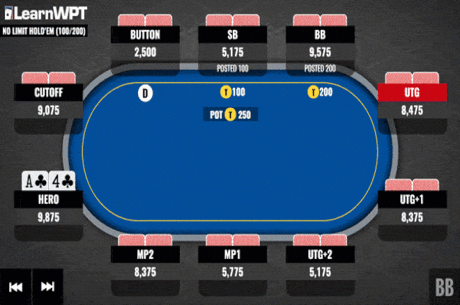15 Micro Limit Poker Mistakes That Are Probably Costing You Money

Learning how to play consistent winning poker at the lower limits can be difficult.
You have to deal with all the wild players that you will encounter at these stakes and learn how to deal with all the bad beats that they will give you. You also need to develop a solid, tight and aggressive strategy and learn how to implement it consistently, no matter how you are feeling or what your recent results have been.
However, the biggest problem for many people at these limits is that they make all sorts of mistakes that hold them back from ever achieving the success for which they work so hard. And many of these mistakes are easily preventable.
In my 10-plus years of pro level experience playing online poker, these are the top 15 mistakes I still see people making all the time and that are probably costing you money.
1. Playing Too Loose
The very first step in poker for most people is learning how to be more selective about what hands they choose to play. You still see some players at the lower stakes in particular who are playing far too many hands to ever be successful.
In a 6-max NL game you should aim to play roughly the top 20 percent of the hands that are dealt to you. In a full ring game (9 or 10 players), you should play roughly the top 15 percent of hands that are dealt to you. In most games, playing more than that almost always means playing too loose.
2. Playing Too Tight
Even more people these days have taken it too far in the opposite direction by playing too tight. If you play online you will often see players who are clearly just playing on too many tables and just waiting for the nuts (e.g., to be dealt aces or kings, to flop a set, etc.).
One reason this a poor strategy overall is you lose tons of value by folding so many hands that could be profitable. But you are also a very easy target for any solid player to push you around. Play tight, but not too tight!
3. Being Too Passive
Another thing that you will commonly see with low stakes players is playing too passively. By this I mean that they don't bet or raise enough. They only get aggressive in the super obvious spots (e.g., when they have the nuts).
One of the biggest keys to a winning poker strategy is the ability to be aggressive in other spots as well, such as when you only have a draw or a weak pair. Find other spots to be aggressive sometimes and you will make yourself much more difficult to play against.
4. Being Too Aggressive
On the flip side of that coin, many people make the opposite mistake of being too aggressive these days. For instance, they will three-bet preflop (reraise) with over 10 percent of their hands. Or they will continuation bet the flop more than 80 percent of the time.
This is going too far in the other direction and once again any decent, thinking player can easily exploit this tendency. Observant opponents will just call you or raise you all day because they know you can't possibly have it this often. Be aggressive, but know when it is smart to lay off the gas pedal a bit, too.
5. Limping
Another old habit that dies hard for some people is limping. Honestly, in 2017 limping just really doesn't have any place in a cash game. No winning poker players do it with any kind of regularity at all.
The reason why is that raising and taking control of the pot is proven to be a much more profitable strategy. When you take control of the pot you give yourself more ways to win. This simply leads to better results.
6. Calling Too Many Three-Bets Out of Position
Another mistake that many newer players make is calling way too many three-bets from out of position with weak hands — e.g., hands like 4♣4♦, A♥9♥, or J♠10♠.
You can sometimes call a three-bet with hands like these if you are in position because it is much easier to win the pot when you have the benefit of acting last. However, if you regularly call three-bets with these hands when you are out of position, you are literally throwing money away in the long run.
7. Calling Too Many Four-Bets
A four-bet is when there is a raise, a reraise and then another reraise before the flop. A mistake that I often see micro stakes players making is calling a four-bet with a hand like AxQx or AxKx only to fold when they miss the flop as will happen two out of three times with these hands.
If playing with typical stacks at these limits, a four-bet usually requires you to put around one-fourth of your stack in the middle preflop. You simply cannot do this and fold every time you miss the board. This is a huge, huge losing play.
You should be making more decisive decisions earlier on in the hand. Typically this means either folding to the four-bet or shoving all the money in and putting all the pressure back on your opponent.
8. Calling the Flop Too Much
A lot of newer players make the mistake of calling the flop too often as if they are playing limit hold'em instead of no-limit.
If you want to call with a really weak hand in order to take the pot away later, then that is fine. However, don't simply call with a weak hand without any plan going forward. This is losing poker.
Avoid calling down with weak hands unless you have a clear plan for how you are going to take the pot away on a subsequent street.
9. Folding the Flop Too Much
Meanwhile many micro stakes players make the opposite mistake of folding too much on the flop. You often see this happening specifically with the extremely tight multi-tabling players that I discussed before.
You simply won't make a good hand like top pair often enough for this to ever be a profitable strategy. That means you need to find ways to continue on with weaker hands as well, once again with a clear plan for how to take the pot away later.
10. Making Transparent Bluffs
A lot of low stakes players also make really weak and transparent bluffs, especially on the river. When the obvious flush draw misses they suddenly fire at the pot with their ace-high, and any thinking player is quickly going to snap off this ill-conceived bluff with their middle-pair hand.
A bluff needs to tell a believable story. There needs to be strong value hands in your range that you would play in the exact same way. Don't just bluff at the pot for no reason.
11. Never Bluffing
Once again we also see the other extreme when it comes to bluffing, with many overly tight players at these limits literally never trying to bluff. This flaw is also highly exploitable. Any thinking player will notice such a pattern and be able to make easy folds with decent hands if they know you are never bluffing.
As a tight player you should be using your table image to your advantage to bluff more often. The great thing about being a tight poker player is that people will naturally give you more respect and make more folds against you.
12. Giving Off Timing Tells
Everybody knows about physical tells in live poker, but many people fail to realize that you can give off many timing tells when playing online poker as well. For example, betting way too fast or way too slow can give away the strength of your hand.
Excluding the super obvious preflop decisions, you should be consistently taking a few seconds to act in any reasonably important situation, whether you are bluffing or you have the nuts.
13. Going to Showdown Too Much
A big mistake a lot of newer poker players make is going to showdown too much. If you are playing online against players who use a HUD, they can tell right away if you are going to showdown too often, because your WTSD (Went To Showdown) percentage will be 30 or higher.
When you go to showdown with too many weak hands, not only do you lose more pots but people will start value betting thinner and thinner against you. Make sure you have a good reason to call a big bet on the river. Don't just look people up any time you have anything.
14. Not Going to Showdown Enough
Once again on the opposite side of the coin we have micro limit players who don't go to showdown often enough. These players will have a WTSD% in the low 20s or less.
Any solid thinking player can take advantage of this by just bluffing more often against such opponents. If you are only going to call river bets with the nuts, then you leave yourself wide open to bluffs.
15. Being Too Results Orientated
The last major mistake that small stakes players make is getting too wrapped up in their short term results. In my recent, popular post describing my 10 years as a poker pro, I actually talk specifically about how I learned to start thinking about this game like a professional does.
Poker pros don't worry about their day-to-day or even week-to-week results. They are focused on the long run instead, which covers months or even years. This is because they know that anything can happen in the short term in poker and those results have very little bearing on their true long term results.
Final Thoughts
Figuring out how to start turning a profit consistently at the micro limits is not always an easy thing. You will face so many crazy players and tons of bad beats. You also need to develop a solid winning strategy for these stakes.
But one of the biggest keys to your success is simply avoiding all of the common mistakes listed above.
You should be playing relatively tight, but also aggressive and with a real understanding and awareness of the power of position in poker. You also want to have a clear plan for how you are going to win the pot at all times.
You want to make sure that you are finding more ways to pick up pots with believable bluffs. And finally, you always need to remember that you are in this thing for the long haul. The pros don't pay any attention to a few bad beats or a bad day at the tables. Neither should you.









